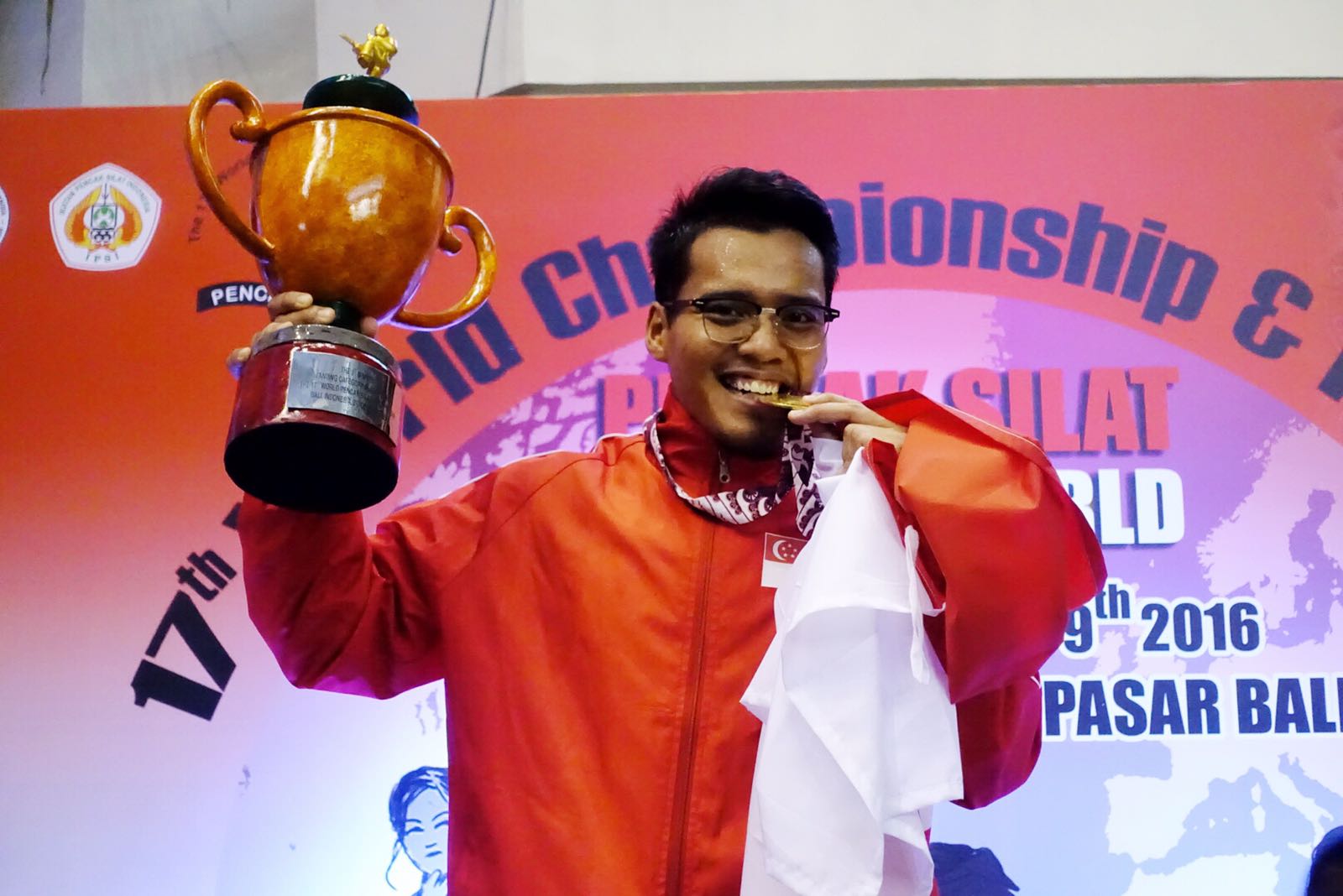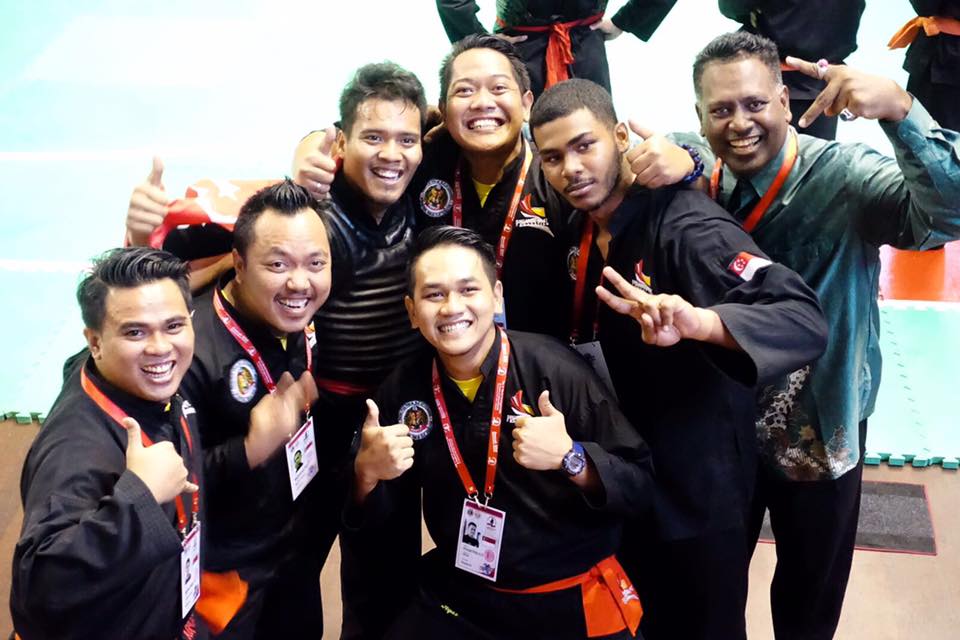SINGAPORE: Prior to the 17th edition of the World Pencak Silat Championships in Bali about three weeks ago, Singapore’s two-time silat world champion Sheik Farhan Sheik Alau’ddin spent close to a year adding to his repertoire of in-ring fight skills.
Thanks to the guidance of his coach, as well as his father Sheik Alau’ddin – a well-known former Silat world champion himself – the 19-year-old Sheik Farhan successfully learnt new techniques which helped him prevail.
Said Sheik Alau’ddin, on his son’s progress: “My team of coaches and I have been working hard to build up (Shaik Farhan’s) abilities earlier this year.”
He added: “He’s since improved three of his techniques, which makes us happy. It’s really heartening to see his desire to try, and that is very important. I can see the confidence in him, and that he clearly knows what he is doing.”
Earlier this month, the Nanyang Polytechnic student beat Mach Quoc Hung of Vietnam 5-0 in the title-deciding bout to retain his Class J world crown he won in 2015.

Class J world champion Sheik Farhan, together with his father and Singapore Silat Federation CEO Sheik Alau’ddin. (Photo: Singapore Silat Federation)
Recounting his son’s progress, Sheik Alau’ddin said: “(Prior to his first title in 2015), Farhan used to ask a lot of questions in training. This time round, he left it to his coach to advise him on what’s best.
“He tends to focus on just a few techniques, but what I hope to see is for him to learn even more.”
Sheik Alau’ddin, a four-time SEA Games champion, added that his son still has some way to go. “Fights tend to be unpredictable, as opposed to being choreographed. Opponents can vary their styles at different stages, so Farhan still needs to know it all, whilst focusing on his specialities.”
Having faced Mach back in 2015 in the same tournament, Shaik Farhan said his previous experience going up against Vietnamese fighter that helped him win. “For me, (the win) was due to the experience from everything – from sheer training, as well as from fighting different types of opponents. It also wasn’t just the experience of fighting him before, but also the knowledge from competing in other competitions, of knowing what to do in different situations.”
He added: “I also don’t really think about what these opponents did before. For me, it’s more about focusing on myself and to just listen to what the coaches have observed on the sidelines.”
Even though his father is a silat icon, Sheik Farhan insists there is no special treatment. “I just treat him as another coach, and I think that’s best. During training, he doesn’t give me special attention.
“Sometimes I feel like I get scolded more, actually. Everyone knows he’s my dad, but he doesn’t give me special attention and I like it to be that way.”
A GUIDING ROLE
It was not too long ago that Shaik Farhan’s senior team-mate Shakir Juanda won his first ever World Championship Final in the Class I category back in 2012.
Repeating the feat once again in Bali, Shakir went on to beat Indonesia’s Firdhana Wahyu Putra in the 2016 Final to became a two-time World Champion, just like his Class J compatriot.

Team Singapore’s Shakir Juanda, who won the Class I world title on Dec 8. (Photo: Singapore Silat Federation)
Acknowledging his young team-mate’s precocious talent, Shakir said: “Shaik Farhan belongs to a new breed of champions. How they think is different from us (senior athletes), as their drive to succeed is very high. Our juniors have a lot of talent in them, but they’d have to be properly nurtured so that once they transition into the senior squad, they’ll be well-prepared to compete at a high level.
“For myself, I’m a late bloomer as I only tasted success at 24. But now, we have guys who start winning at 17 or 18. I definitely think we have a good bunch of talents waiting in the wings that just need continued guidance,” said the 28-year-old, who had to compete in the Artistic competition instead in the 2015 SEA Games, due to a previous injury.
Accepting his role as the senior member of the national squad, Shakir says he now mentors his younger counterparts on how to deal with pre-match nerves. “I do indeed give encouragement to them as most are new, and they do not know what to expect.
“I told some of them: ‘Hey, you may be a newbie but feel free to go all out, as people don’t have any expectations of you. There’s nothing to be afraid of.’”
He added: “On my end, I give them moral support and motivation so that they’d have the self-belief to give their 100 per cent. I think it’s normal for one to be nervous right before a match, as it’s the body’s way of telling itself to get ready.
“But too much nervousness is not good as well, as it will affect your warm-up and when you’re too hyped up, you tend to lose your composure and so on.”
INSPIRING THE NEXT GENERATION OF CHAMPIONS
With both Shaik Farhan and Shakir Juanda’s wins at the recently concluded World Championships in Bali, Singapore Silat’s Shaik Alau’ddin hopes that it’ll inspire more youths to join the national team. “In Farhan’s case, he made a mark at the age of 17 as he won the 2015 world title. His achievement shows that anyone out there can be a champion at 17.
“This helps me convince parents who send their juniors to train with the national team, that their kids too, can be a world champion like Farhan. So that’s a good thing.”

The Singapore silat exponents at the World Pencak Silat Championships in Bali. (Photo: Singapore Silat Federation/Facebook)
“We have only one veteran in the squad, Shakir (Juanda). He’s there to show that one can have a long competitive journey in silat, to even beyond their late 20s,” he said.
“I think with these two guys, their age will help me open doors and persuade more young athletes, and even their parents and clubs, that every single one of them is important to the national cause.”
Hinting at future plans to promote the sport further, the Silat Federation CEO said: “For 2017 we’d like to explore publicising the sport through mainstream and social media. We want more people to aware that we are recruiting new athletes regardless of their age – from the age of 3 to young adults at 17 – as long as they have the desire to work hard.
“It doesn’t matter if they don’t yet know how to kick, as we will train them. We want to invest time for them to be ready for a major championship.”




